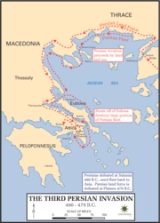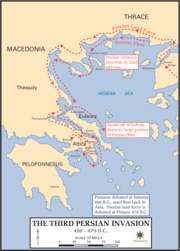
479 BC
Encyclopedia

Roman calendar
The Roman calendar changed its form several times in the time between the founding of Rome and the fall of the Roman Empire. This article generally discusses the early Roman or pre-Julian calendars...
. At the time, it was known as the Year of the Consulship of Vibulanus and Rutilus (or, less frequently, year 275 Ab urbe condita
Ab urbe condita
Ab urbe condita is Latin for "from the founding of the City ", traditionally set in 753 BC. AUC is a year-numbering system used by some ancient Roman historians to identify particular Roman years...
). The denomination 479 BC for this year has been used since the early medieval period, when the Anno Domini
Anno Domini
and Before Christ are designations used to label or number years used with the Julian and Gregorian calendars....
calendar era
Calendar era
A calendar era is the year numbering system used by a calendar. For example, the Gregorian calendar numbers its years in the Western Christian era . The instant, date, or year from which time is marked is called the epoch of the era...
became the prevalent method in Europe for naming years.
Greece
- The PersianAchaemenid EmpireThe Achaemenid Empire , sometimes known as First Persian Empire and/or Persian Empire, was founded in the 6th century BCE by Cyrus the Great who overthrew the Median confederation...
commander MardoniusMardoniusMardonius was a leading Persian military commander during the Persian Wars with Greece in the early 5th century BC.-Early years:Mardonius was the son of Gobryas, a Persian nobleman who had assisted the Achaemenid prince Darius when he claimed the throne...
, now based in ThessalyThessalyThessaly is a traditional geographical region and an administrative region of Greece, comprising most of the ancient region of the same name. Before the Greek Dark Ages, Thessaly was known as Aeolia, and appears thus in Homer's Odyssey....
, wins support from Argus and western ArcadiaArcadiaArcadia is one of the regional units of Greece. It is part of the administrative region of Peloponnese. It is situated in the central and eastern part of the Peloponnese peninsula. It takes its name from the mythological character Arcas. In Greek mythology, it was the home of the god Pan...
. He tries to win over AthensAthensAthens , is the capital and largest city of Greece. Athens dominates the Attica region and is one of the world's oldest cities, as its recorded history spans around 3,400 years. Classical Athens was a powerful city-state...
but fails. - Mardonius attacks Athens once more and the Athenians are forced to retreat, whereupon he razes the city. The SpartansHistory of SpartaThe History of Sparta describes the destiny of the ancient Dorian Greek state known as Sparta from its beginning in the legendary period to its forced incorporation into the Achaean League under the late Roman Republic, its conquerors, in 146 BCE, a period of roughly 1000 years...
march north to support Athens against the Persians. - August 27
- The Battle of PlataeaBattle of PlataeaThe Battle of Plataea was the final land battle during the second Persian invasion of Greece. It took place in 479 BC near the city of Plataea in Boeotia, and was fought between an alliance of the Greek city-states, including Sparta, Athens, Corinth and Megara, and the Persian Empire of Xerxes...
in BoeotiaBoeotiaBoeotia, also spelled Beotia and Bœotia , is one of the regional units of Greece. It is part of the region of Central Greece. It was also a region of ancient Greece. Its capital is Livadeia, the second largest city being Thebes.-Geography:...
ends the Persian invasions of GreeceAncient GreeceAncient Greece is a civilization belonging to a period of Greek history that lasted from the Archaic period of the 8th to 6th centuries BC to the end of antiquity. Immediately following this period was the beginning of the Early Middle Ages and the Byzantine era. Included in Ancient Greece is the...
as the Persian general Mardonius is routed by the Greeks under PausaniasPausanias (general)Pausanias was a Spartan general of the 5th century BC. He was the son of Cleombrotus and nephew of Leonidas I, serving as regent after the latter's death, since Leonidas' son Pleistarchus was still under-age. Pausanias was also the father of Pleistoanax, who later became king, and Cleomenes...
, nephew of the former Spartan King, Leonidas ILeonidas ILeonidas I was a hero-king of Sparta, the 17th of the Agiad line, one of the sons of King Anaxandridas II of Sparta, who was believed in mythology to be a descendant of Heracles, possessing much of the latter's strength and bravery...
. The Athenian contingent is led by the repatriated AristidesAristidesAristides , 530 BC – 468 BC was an Athenian statesman, nicknamed "the Just".- Biography :Aristides was the son of Lysimachus, and a member of a family of moderate fortune. Of his early life, it is only told that he became a follower of the statesman Cleisthenes and sided with the aristocratic party...
. Mardonius is killed in the battle and the Greeks capture enormous amounts of loot. ThebesThebes, GreeceThebes is a city in Greece, situated to the north of the Cithaeron range, which divides Boeotia from Attica, and on the southern edge of the Boeotian plain. It played an important role in Greek myth, as the site of the stories of Cadmus, Oedipus, Dionysus and others...
is captured shortly thereafter and the Theban collaborators executed by Pausanias. - Meanwhile at sea, the Persians are defeated by a Greek fleet headed by LeotychidasLeotychidasLeotychidas [Leotychides, Latychidas] was a ruler of Sparta 491 BC-476 BC. He led Spartan forces during the Persian Wars from 490 BC to 478 BC...
of Sparta and XanthippusXanthippusXanthippus was a Greek mercenary general hired by the Carthaginians to aid in their war against the Romans during the First Punic War...
of Athens in the Battle of MycaleBattle of MycaleThe Battle of Mycale was one of the two major battles that ended the second Persian invasion of Greece during the Greco-Persian Wars. It took place on or about August 27, 479 BC on the slopes of Mount Mycale, on the coast of Ionia, opposite the island of Samos...
, off the coast of LydiaLydiaLydia was an Iron Age kingdom of western Asia Minor located generally east of ancient Ionia in the modern Turkish provinces of Manisa and inland İzmir. Its population spoke an Anatolian language known as Lydian....
in Asia MinorAnatoliaAnatolia is a geographic and historical term denoting the westernmost protrusion of Asia, comprising the majority of the Republic of Turkey...
.
- The Battle of Plataea
- PotidaeaPotidaeaPotidaea was a colony founded by the Corinthians around 600 BC in the narrowest point of the peninsula of Pallene, the westernmost of three peninsulas at the southern end of Chalcidice in northern Greece....
is struck by a tsunamiTsunamiA tsunami is a series of water waves caused by the displacement of a large volume of a body of water, typically an ocean or a large lake...
.
Deaths
- August 27 – MardoniusMardoniusMardonius was a leading Persian military commander during the Persian Wars with Greece in the early 5th century BC.-Early years:Mardonius was the son of Gobryas, a Persian nobleman who had assisted the Achaemenid prince Darius when he claimed the throne...
, PersianAchaemenid EmpireThe Achaemenid Empire , sometimes known as First Persian Empire and/or Persian Empire, was founded in the 6th century BCE by Cyrus the Great who overthrew the Median confederation...
general (killed in the Battle of PlataeaBattle of PlataeaThe Battle of Plataea was the final land battle during the second Persian invasion of Greece. It took place in 479 BC near the city of Plataea in Boeotia, and was fought between an alliance of the Greek city-states, including Sparta, Athens, Corinth and Megara, and the Persian Empire of Xerxes...
) - ConfuciusConfuciusConfucius , literally "Master Kong", was a Chinese thinker and social philosopher of the Spring and Autumn Period....
, ChineseChinaChinese civilization may refer to:* China for more general discussion of the country.* Chinese culture* Greater China, the transnational community of ethnic Chinese.* History of China* Sinosphere, the area historically affected by Chinese culture...
philosopherPhilosophyPhilosophy is the study of general and fundamental problems, such as those connected with existence, knowledge, values, reason, mind, and language. Philosophy is distinguished from other ways of addressing such problems by its critical, generally systematic approach and its reliance on rational...
(b. 551 BC) - Ephialtes, betrayer of the SpartaSpartaSparta or Lacedaemon, was a prominent city-state in ancient Greece, situated on the banks of the River Eurotas in Laconia, in south-eastern Peloponnese. It emerged as a political entity around the 10th century BC, when the invading Dorians subjugated the local, non-Dorian population. From c...
ns in the Battle of ThermopylaeBattle of ThermopylaeThe Battle of Thermopylae was fought between an alliance of Greek city-states, led by King Leonidas of Sparta, and the Persian Empire of Xerxes I over the course of three days, during the second Persian invasion of Greece. It took place simultaneously with the naval battle at Artemisium, in August...

